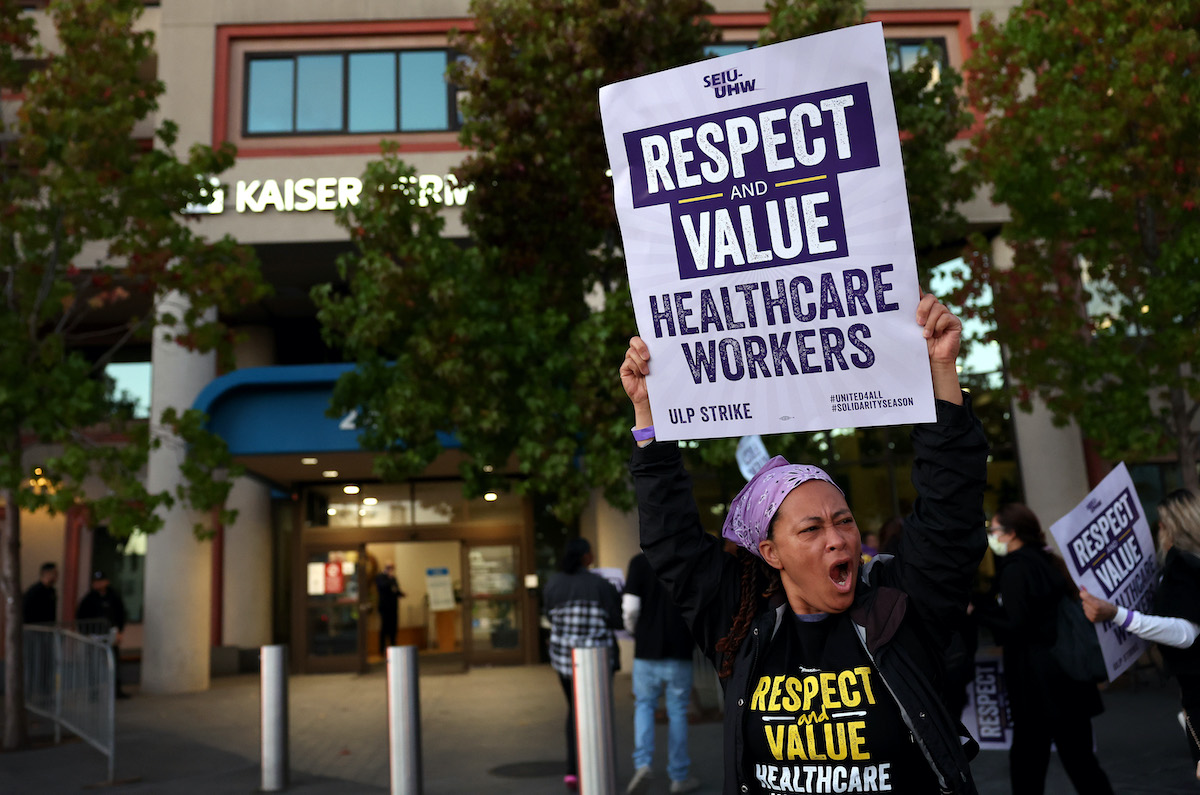75,000 Frontline Kaiser Health Care Workers Begin 3-Day Strike

The era of workers fighting back continues. Today, 75,000 workers for Kaiser Permanente walked off the job. This is believed to be the largest healthcare worker strike in the history of the United States. Kaiser is a large not-for-profit health provider with unionized employees working across seven states and Washington DC. The current strike is mostly on the West Coast with California having by far the most workers on strike, with over 68,000. This show of unity and force is expected to last through Saturday morning. Though, if negotiations do not yield any results, the strike could come again in November. That’s according to SEIU-UHW which is the largest union in this coalition.
The striking workers represent about 40% of Kaiser’s total staff, a substantial number. They are bringing much-needed attention to the needs of healthcare workers, who have always been crucial but became flat-out superheroes with the onset of the COVID-19 pandemic. The workers’ contracts expired on September 30 and negotiations have been taking place, centered around sentiments that those in the healthcare field have been saying for a long time. I know that even when my mother was a nurse, I heard complaints about burnout and being overworked—some of the exact reasons why this large strike is taking place. Kaiser has said that they hope to hire 10,000 new employees by the end of 2023 to try and help mitigate some of these concerns.
The union also wants higher pay, which could help workers who feel they have been forced to do more with the existing staff shortages although according to CNN, the SEIU-UHW is saying that Kaiser and the union are not close to reconciling their stances on raises. They are also saying that Kaiser offered location-dependent wage hikes but they did not think it went far enough. For example, the maximum increase would be 4% for each of the four new years in the contract. The union members just didn’t think that number helped their employees keep up with the rising cost of living that is plaguing so many Americans.
The Kaiser striking coalition is asking for a raise of 6.5% in the first two years of the new contract, and 5.75% in the last two years. Though Kaiser says they are a market leader in pay, SEIU-UHW spokesperson Renee Saldana told CNN that workers endured the worst global health crisis we have seen in our lifetimes and yet they are still concerned about things like paying rent. Some agreements have taken place though, which provide hope going forward. Kaiser and the coalition agreed on renewing subcontracting protections and promised to give a 60-day notice to remote staff about returning to work. This is so key because COVID has really uprooted many people and changed our view of work. It is easy to get comfortable in a state of working remotely. Allowing 60 days for workers to readjust both mentally and logistically, with sorting out things like childcare and transportation is a fair way to make their lives a little bit easier.
In the end, this strike appears to come down to the same issue as pretty much every other strike we’ve seen this year and beyond: corporate greed and an unfair distribution of profits. As The Guardian notes:
Unions pointed to Kaiser Permanente’s recent profits of $3bn in the first half of 2023 and decried exorbitant salaries of executives.
“Record profits should mean record contracts that invest in workers and the patients we serve,” said Dawn Martin, a medical assistant in Battle Ground, Washington. “Kaiser executives are refusing to listen to frontline healthcare workers like me and are bargaining in bad faith over the solutions we need to end the Kaiser short-staffing crisis.”
A fair concern a lot of people have regarding the strike is what will happen to patients. Kaiser works a little bit differently in their operations than most other providers; their members pay dues to them in order to access their health care services. Doctors and most registered nurses are not a part of the strike, but care for some may still be impacted. Kaiser has said that they tried to prepare as best as possible but some elective services may be rescheduled. A Kaiser spokesperson said that their hospitals and ERs will remain open.
I hope that these workers get what they are demanding. Being around healthcare professionals my entire life, I understand how much they sacrifice for their jobs. Being protected and getting increased wages will also help retain people who are too good to lose. These union members are trying to balance making their voices heard and protecting people’s ability to have care and receive key services. I think this could be a good template going forward.
(featured image: Justin Sullivan/Getty Images)
Have a tip we should know? [email protected]